NavSource Online: Submarine Photo Archive
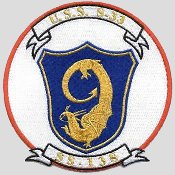
Patch courtesy of
Don McGrogan, BMCS, USN (ret.)
Please report any broken links or trouble you might come across to the Webmaster.
Please take a moment to let us know so that we can correct any problems and make your visit as enjoyable and as informative as possible.

| Click On Image For Full Size | Size | Image Description | Source | |
|---|---|---|---|---|
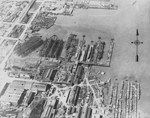 0814300 |
7.80k | Union Iron Works, San Francisco, California. Photographed during World War I, with four-piper destroyers under construction at the Risdon Iron Works in the lower right. Four submarines and one destroyer hull in dry-dock are at the piers in the center, along with some large merchant ships. Risdon, part of Union, is to the lower right of the ink line. 1-Cafeteria, 2-Store room, 3-Iron Foundry, 4-Brass Foundry, 5-Machine shop, 6-Pattern shop, 7-Erecting machine shop, 8-Administration building, 9-Power house, 10-office bldg., Govt. offices, 11-Blacksmith shop, 12-Bioler shop, 13-Joiner shop, 14-Joiner shop, Annex with oil storage tanks underneath, 15-Warehouse and office bldg., 16-Pipe and copper shop, 17-Steel storage, 18-Plate shop, 19-Gate house, 20-Building slips 4&5, 21-Building slips 1.2 & 3, 22-Wharf #2, 23-Wharf #3, 24-Floating dock, capacity 2000 tons, 25-Floating dock, capacity 6500 tons, 26-Wharf #4, 27-Wharf #5, S-Storage space 2--Risdon Plant shown south and east of red lines: 1-Copper storage, 2- Oil tank, 3-Office building, 4-Office building, 5-Yarrow boiler shop, 6-Warehouse, 7-Power house, 8-Blacksmith shop, 9-Storehouse, 10-Sheet metal shop, 11-Sheet metal shop, 12-Marine machine shop, 13-Wharves, 14-Wharves, 15-Wharves. Appearing here in no order are vessels that were constructed but not necessarily here: 6 of 27 R-class submarines first keel laid: R-16 (SS-93), 26 April 1917, last: R-19 (SS-96), 23 June 1917 first launch: R-15 (SS-92), 10 December 1917, last: R-19, 28 January 1918 R-15 (SS-92) ... R-20 (SS-97) 12 of 51 S-class submarines S-30 (SS-135) ... S-41 (SS-146) 26 of 111 Wickes-class destroyers for the United States Navy between 1917 and 1919 first keel laid: Ringold (DD-89), 20 October 1917, last: Stansbury (DD-180), 9 December 1918 first launch: McKee (DD-87), 23 March 1918, last: Stansbury, 16 May 1919, 8 are launched on 4 July 1918 McKee (DD-87) ... Gridley (DD-92), Schley (DD-103), ... Ludlow (DD-112), Burns (DD-171) & ... Stansbury (DD-180) 40 of 156 Clemson-class destroyers for the United States Navy between 1918 and 1921 Chauncey (DD-296) ... Melvin (DD-335) |
Photo courtesy of history.navy.mil | |
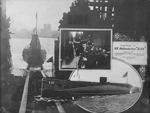 |
746k | Composite photo of S-33's (SS-138) sponsor, Mrs. Thomas M. Searles & the waterborne S-33 after her launch on 5 December 1918. The contributor's grandfather was Thomas Mount Searles, USNA ’13. Attended Old Miss at age 13 for engineering, then the Naval Academy and then MIT. After graduating from MIT he oversaw construction in the Navy and the $200 million budget for the construction of subs and destroyers. His grandmother was a natural choice to christen one of the many projects he oversaw. He resigned from the Navy in 1920. | Photo courtesy of Clifford Searles. | |
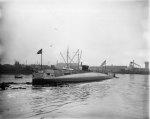 |
82k | Port side view of the S-33 (SS-138) waterborne after her launch on 5 December 1918. | USN photo courtesy of Darryl L. Baker. | |
 |
74k | The S-boats (SS-105/146-153/162) were almost an alternative to fleet boats, capable of great range (of pre WW I standards) though not of high surface speed. S-33(SS-138) was typical of the first series S-18/41(SS-123-146) of E.B.- built "Holland" S-boats. Redesigned during construction to mount powerful 4in/50 guns instead of the planned 3in/23s, they had prominent gun sponsons. They could be distinguished from the second series of "Holland" boats by the small ammunition-passing trunks at the fore end of their trunk conning tower fairwaters (covered by the second "3" in S-33; the later boats had much larger gun crew access hatch trunks. The prominent skeg aft (the sloping continuation of the upper deck) was typical of E.B. designs. |
Photo & text courtesy of U.S. Submarines Through 1945, An Illustrated Design History by Norman Friedman. Naval Institute Press. |
|
 |
113k | The small submarines were conceived as successors to WW I-built R & S-boat. Four first-generation Holland S-boats are shown, three of them identifiable, two with their radio masts raised: S-34 (SS-139), S-32 (SS-137) & S-33(SS-138) . | USN photo. Text courtesy of U.S. Submarines Through 1945, An Illustrated Design History by Norman Friedman. Naval Institute Press. |
|
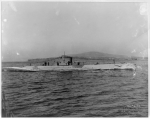 |
1.04k | 19 photo PDF of various views of the S-33(SS-138) on her sea trials at San Pedro, California, 3-5 November 1920. | USN photos # 19-N-6082 / N-9858, from the National Archives and Records Administration (NARA), courtesy of Daniel Dunham. | |
 |
113k | The S-boat was the culmination of E.B. single-hull design for the U.S. Navy. This is a typical unit of the S-30-41 (SS-135-46) group, as completed. Ballast trunks are indicated. Lines below the hull show the location of the fuel tanks forward & aft (the foremost two tanks of the after group are the lubricating oil tank & sump tank). Arrows indicate the two Fessenden oscillators under the boat's keel, fore & aft. Arrows in the bridge structure indicate the three periscopes (one in the conning tower, soon removed) the telescoping radio mast & the radio tube leading down into the radio room. In the control room the wheels controlling the planes were on the port side: the three levers for the Kingston valves were on the opposite side, abaft the chart table. The radio room, (below the radio tube, into which the antenna leads ran) was set into the after port side of the control room. Abaft the main motors were auxiliaries: the low pressure main ballast pump on the center-line, the high pressure main ballast pump on the starboard shaft, the motor for the Fessenden oscillator on the port shaft. |
Drawing & Text courtesy of U.S. Submarines Through 1945, An Illustrated Design History by Norman Friedman. Naval Institute Press. |
|
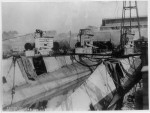 |
188k | Inboard alongside pier are the S-30 (SS-135), S-33 (SS-138), and S-20 (SS-125), at the Groton CT, Navy Yard, 2 October 1923. | USN photo # 19-N-8918, from the National Archives and Records Administration (NARA), courtesy of Daniel Dunham. | |
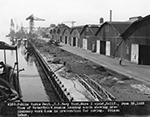 |
900k | I included the original Mare Island Public Works photo (above) which show waterfront paving work at the yard on 25 June 1925 and a cropped view of the S class submarine on the far left of the photo. "Prison labor" means that the prisoners from Mare Island Naval Brig were doing the work, another story of the yard not often told. Shipyard journals of the period indicate that the submarine in the foreground is S-33 (SS-138) and she was in overhaul at the yard from 1 September 1924 until 3 October 1925. You will note the temporary access patch over her engine room. The six boats in the background are S-24 (SS-129), S-25 (SS-130), S-26 (SS-131), S-27 (SS-132), & S-28 (SS-133) & S-29 (SS-134), all arrived at the yard on 24 June 1925 along with Savannah (AS-8). It appears the photo was taken from the stern of the Savannah. |
Vallejo Naval & Historical Museum photo courtesy of Darryl L. Baker. | |
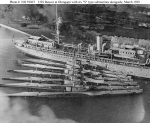 |
122k | Beaver (AS-5) at Olongapo, Philippines, with six submarines alongside, in March 1929.
The submarines are (from front to rear): S-32 (SS-137), S-35 (SS-140), S-30 (SS-135), S-33 (SS-138), S-31 (SS-136), & S-34 (SS-139). | USNHC photograph # NH 59967. | |
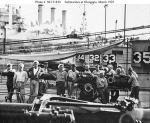 |
128k | Submarines at Olongapo Naval Station, Philippines.
Crewmen posing with a 4"/50 deck gun on board a S-boat, March 1929, with another 4"/50 in the foreground. These submarines are probably S-30 (SS-135) and S-31 (SS-136). Behind them are (from front to rear): S-35 (SS-140), S-33 (SS-138); S-32 (SS-137); and S-34 (SS-139). Photographed from Beaver (AS-5). In the background is Pittsburgh (CA-4), in the Dewey drydock. | USNHC photograph # NH 51830. | |
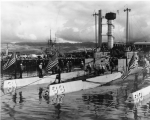 |
262k | Stern view of the S-31 (SS-136), S-33(SS-138), and S-32 (SS-137) (just visible) at Pearl Harbor circa mid 1930's. On the far left of the photo, on the other side of the pier, the bow of the Argonaut (SS-166) is just visible. The after superstructure skeg has already been cut away as part of a safety and maintenance program initiated after the S-4 (SS-109) disaster. | Text courtesy of David Johnston USN photo courtesy of Darryl L. Baker. | |
 | 17k | Commemorative postal cover marking the decommissioning of the S-33 (SS-138), 1 December 1937. | Courtesy of Jack Treutle (of blessed memory). | |
 |
20k | Commemorative post mark on the occasion of the
decommissioning of Submarine Division 9 on 7 December 1937. The subs appearing are: S-30 (SS-135) S-31 (SS-136) S-32 (SS-137) S-33 (SS-138) S-34 (SS-139) & S-35 (SS-140). |
Courtesy of Jack Treutle (of blessed memory). | |
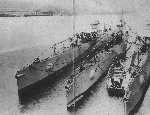 |
292k | From left to right: S-30 (SS-135), S-32 (SS-137) & S-33 (SS-138) at the Panama Canal Zone, where they operated from December 1940 until April 1941. | USN photo courtesy of CTM Russel Rau, former COB of SS-238 Wahoo, submitted by Bill Rau & Paul Crozier. Text courtesy of DANFS. | |
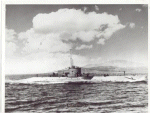 | 46k | S-33 (SS-138), starboard view underway off the coast of San Francisco, date unknown. | Courtesy of John Hummel, USN (Retired). | |
 | 20k | S-33 (SS-138), with other S-boats, date and place unknown. | Courtesy of John Hummel, USN (Retired). | |
 |
54k | From outboard to inboard, S-31 (SS-136), S-35 (SS-140), S-33 (SS-138), and S-34 (SS-139), probably in the Philippines. | Vance Adams for his father, Lt. Vance Adams USN Ret (deceased). | |
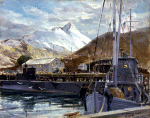 |
73k | An 1942 oil painting on board, by the artist William F. Draper entitled "Sub and Yippy Tie Up." In a quiet inlet of the Bering Sea in 1942, a YP boat gets a coat of paint and an S-boat ties up for fuel and provisions. The short Alaskan day is ending and lights may be seen in the barracks until total darkness requires a blackout. The S-boats that served in the Aleutians theater were: S-18 (SS-123), S-23 (SS-128), S-27 (SS-132), S-28 (SS-133), S-30 (SS-135), S-31 (SS-136), S-32 (SS-137), S-33 (SS-138), S-34 (SS-139), S-35 (SS-140), S-36 (SS-141), S-40 (SS-145), S-41 (SS-146), S-42 (SS-153), S-44 (SS-155), S-45 (SS-156), S-46 (SS-157), & S-47 (SS-158). | Sub and Yippy Tie Upby William F. Draper. Painting #13 / 88-189-N. Courtesy of the USNHC. |
|
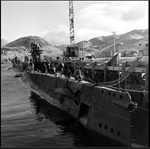 | 400k | The S-33 (SS-138) at Dutch Harbor, Aleutian Islands, 1943. | Photographer: Dimitri Kessel, courtesy of life.time.com. | |
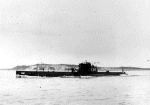 | 87k | Most likely a later war era picture of the S-33 (SS-138), taken after August 1943 when she commenced operations with the West Coast Sound School which were continued until 13 August 1945. | USN photo courtesy of ussubvetsofworldwarii.org. | |
| Back To The Main Photo Index | Back To the Submarine Index |
| Problems and site related matters, E-mail Webmaster |
| This page is created by Gary Priolo and maintained by Michael Mohl All Pages © 1996 - 2025 NavSource History |